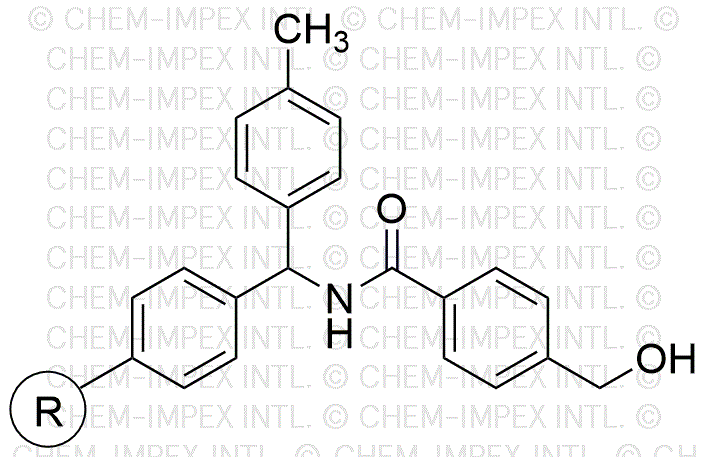4-Hydroxymethylbenzoic acid-MBHA resin is widely utilized in research focused on:
- Peptide Synthesis: This resin serves as a solid support for synthesizing peptides through solid-phase peptide synthesis (SPPS), allowing for efficient and high-yield production of complex peptides.
- Drug Development: Researchers use this resin to create peptide-based drugs, benefiting from its ability to facilitate the attachment of various functional groups for drug modification and optimization.
- Bioconjugation: The resin is effective in bioconjugation processes, enabling the attachment of biomolecules to surfaces or other molecules, which is crucial in developing targeted therapies and diagnostics.
- Analytical Chemistry: It is employed in chromatography applications, helping to purify and analyze peptide mixtures, thereby enhancing the accuracy of research findings.
- Custom Resin Development: The versatility of this resin allows researchers to tailor it for specific applications, providing a competitive edge in developing novel materials for various scientific fields.
General Information
Properties
Safety and Regulations
Applications
4-Hydroxymethylbenzoic acid-MBHA resin is widely utilized in research focused on:
- Peptide Synthesis: This resin serves as a solid support for synthesizing peptides through solid-phase peptide synthesis (SPPS), allowing for efficient and high-yield production of complex peptides.
- Drug Development: Researchers use this resin to create peptide-based drugs, benefiting from its ability to facilitate the attachment of various functional groups for drug modification and optimization.
- Bioconjugation: The resin is effective in bioconjugation processes, enabling the attachment of biomolecules to surfaces or other molecules, which is crucial in developing targeted therapies and diagnostics.
- Analytical Chemistry: It is employed in chromatography applications, helping to purify and analyze peptide mixtures, thereby enhancing the accuracy of research findings.
- Custom Resin Development: The versatility of this resin allows researchers to tailor it for specific applications, providing a competitive edge in developing novel materials for various scientific fields.
Documents
Safety Data Sheets (SDS)
The SDS provides comprehensive safety information on handling, storage, and disposal of the product.
Product Specification (PS)
The PS provides a comprehensive breakdown of the product’s properties, including chemical composition, physical state, purity, and storage requirements. It also details acceptable quality ranges and the product's intended applications.
Certificates of Analysis (COA)
Search for Certificates of Analysis (COA) by entering the products Lot Number. Lot and Batch Numbers can be found on a product’s label following the words ‘Lot’ or ‘Batch’.
Número de catálogo
Número de lote/lote
Certificates Of Origin (COO)
This COO confirms the country where the product was manufactured, and also details the materials and components used in it and whether it is derived from natural, synthetic, or other specific sources. This certificate may be required for customs, trade, and regulatory compliance.
Número de catálogo
Número de lote/lote
Safety Data Sheets (SDS)
The SDS provides comprehensive safety information on handling, storage, and disposal of the product.
DownloadProduct Specification (PS)
The PS provides a comprehensive breakdown of the product’s properties, including chemical composition, physical state, purity, and storage requirements. It also details acceptable quality ranges and the product's intended applications.
DownloadCertificates of Analysis (COA)
Search for Certificates of Analysis (COA) by entering the products Lot Number. Lot and Batch Numbers can be found on a product’s label following the words ‘Lot’ or ‘Batch’.
Número de catálogo
Número de lote/lote
Certificates Of Origin (COO)
This COO confirms the country where the product was manufactured, and also details the materials and components used in it and whether it is derived from natural, synthetic, or other specific sources. This certificate may be required for customs, trade, and regulatory compliance.


